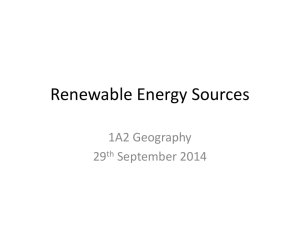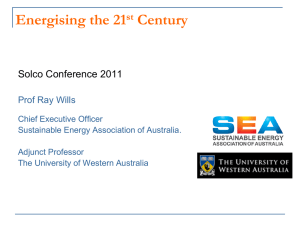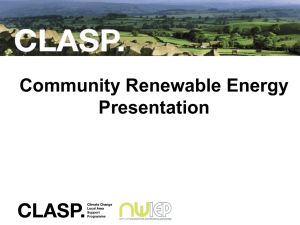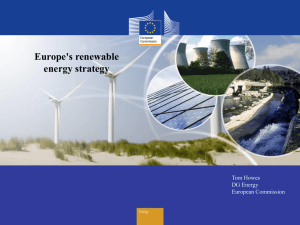Renewable Energy
advertisement
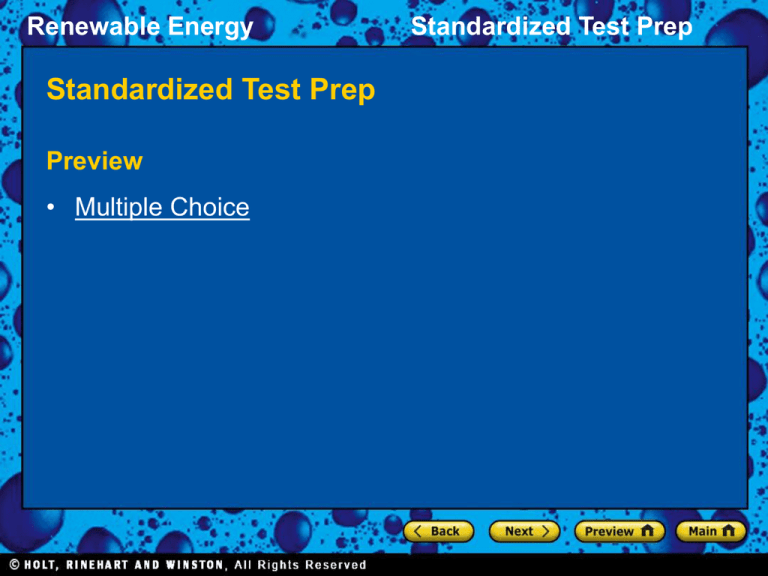
Renewable Energy Standardized Test Prep Preview • Multiple Choice Standardized Test Prep Renewable Energy Standardized Test Prep Multiple Choice 1. What is the ultimate source of all renewable energy? A. the biosphere B. the moon C. the ocean D. the sun Renewable Energy Standardized Test Prep Multiple Choice 1. What is the ultimate source of all renewable energy? A. the biosphere B. the moon C. the ocean D. the sun Renewable Energy Standardized Test Prep Multiple Choice, continued 2. Which of the following is a renewable energy source? F. coal mine G. gas pipeline H. power plant I. wind farm Renewable Energy Standardized Test Prep Multiple Choice, continued 2. Which of the following is a renewable energy source? F. coal mine G. gas pipeline H. power plant I. wind farm Renewable Energy Standardized Test Prep Multiple Choice, continued 3. What is the most important factor in the development and implementation of alternative energy sources? A. The most important factor is the abundance of the source. B. The most important factor is its cost effectiveness. C. The most important factor is whether government approval can be obtained. D. The most important factor is if the source can gain social acceptance. Renewable Energy Standardized Test Prep Multiple Choice, continued 3. What is the most important factor in the development and implementation of alternative energy sources? A. The most important factor is the abundance of the source. B. The most important factor is its cost effectiveness. C. The most important factor is whether government approval can be obtained. D. The most important factor is if the source can gain social acceptance. Renewable Energy Standardized Test Prep Multiple Choice, continued 4. Why is hydrogen called the fuel of the future? F. It is very inexpensive to produce. G. It requires very little energy to produce. H. It is the most abundant element in the universe. I. It contains carbon which disperses in the atmosphere when burned. Renewable Energy Standardized Test Prep Multiple Choice, continued 4. Why is hydrogen called the fuel of the future? F. It is very inexpensive to produce G. It requires very little energy to produce. H. It is the most abundant element in the universe. I. It contains carbon which disperses in the atmosphere when burned. Renewable Energy Standardized Test Prep Multiple Choice, continued Use this map to answer questions 5 and 6. Renewable Energy Standardized Test Prep Multiple Choice, continued 5. What can be inferred about the use of hydroelectric power in the United States? A. There are more dams in Oregon than in Kansas. B. There is more hydroelectric power used in New Mexico than in Alabama. C. The upper Midwest uses more water for hydroelectric power than New England. D. The biggest users of water for hydroelectricity are located along the Mississippi River. Renewable Energy Standardized Test Prep Multiple Choice, continued 5. What can be inferred about the use of hydroelectric power in the United States? A. There are more dams in Oregon than in Kansas. B. There is more hydroelectric power used in New Mexico than in Alabama. C. The upper Midwest uses more water for hydroelectric power than New England. D. The biggest users of water for hydroelectricity are located along the Mississippi River. Renewable Energy Standardized Test Prep Multiple Choice, continued 6. How many states use 10,000 million gallons of water or less per day? F. 5 G. 10 H. 15 I. 20 Renewable Energy Standardized Test Prep Multiple Choice, continued 6. How many states use 10,000 million gallons of water or less per day? F. 5 G. 10 H. 15 I. 20 Renewable Energy Standardized Test Prep Multiple Choice, continued Use this map to answer question 7. Renewable Energy Standardized Test Prep Multiple Choice, continued 7. What type of electrical generation is depicted in the diagram? A. fuel cell B. geothermal plant C. ocean thermal energy D. tidal plant Renewable Energy Standardized Test Prep Multiple Choice, continued 7. What type of electrical generation is depicted in the diagram? A. fuel cell B. geothermal plant C. ocean thermal energy D. tidal plant
